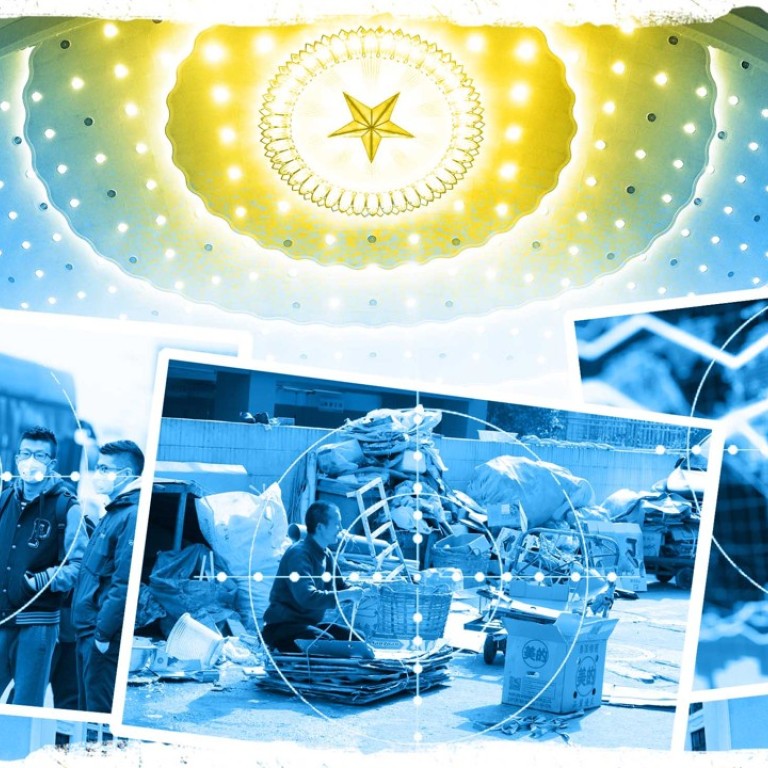
China’s new vice-premiers to lead battles against poverty, pollution and economic risks
Three of President Xi Jinping’s top priorities will be overseen by new men
China is most likely to have four new vice-premiers after this month’s annual meeting of the National People’s Congress (NPC), with three of them expected to be put in charge of three of President Xi Jinping’s top priorities: poverty relief, environmental protection and the control of economic risks.
Former Guangdong party boss Hu Chunhua, the youngest member of the party’s 25-strong decision-making Politburo, rose from poverty-stricken backwater.
Han Zheng, a member of the Communist Party’s innermost Politburo Standing Committee, burnished his pollution control credentials in his previous post as party boss of Shanghai.
Xi’s top economic adviser, Liu He, and former United Front Work Department head Sun Chunlan, both Politburo members, will round out the quartet.
The party’s 200-member Central Committee met this week to finalise the appointments of senior state officials, which will be endorsed at the end of the national legislature’s full session that opens on Monday. Unless there are last-minute surprises during the NPC’s fortnight of closed-door deliberations, the four vice-premiers are expected to take key roles in navigating the road map laid out by Xi at the party’s national congress in October to realise the so-called Chinese dream.
That envisions China becoming a “moderately well-off society” by 2020 and then a fully developed nation in economic, technological and military terms by 2050, completing the “great rejuvenation of the Chinese nation” that is the party’s top priority under Xi.
The realisation of a “moderately well-off society” originally focused on doubling per capita gross domestic product between 2010 and 2020, but under Xi “three critical battles” have been added as benchmarks: lifting all people in mainland China out of poverty, controlling pollution and preventing major economic risks.
China’s State Council, the cabinet, will see a five-yearly reshuffle of its leading figures at the annual meeting of the NPC, China’s legislature, beginning on March 5. Premier Li Keqiang is almost certain to be given a second term in office, but his four deputies will either retire or be promoted. Most of the five state councillors, who rank between vice-premiers and ministers in China’s political hierarchy, will also be replaced.
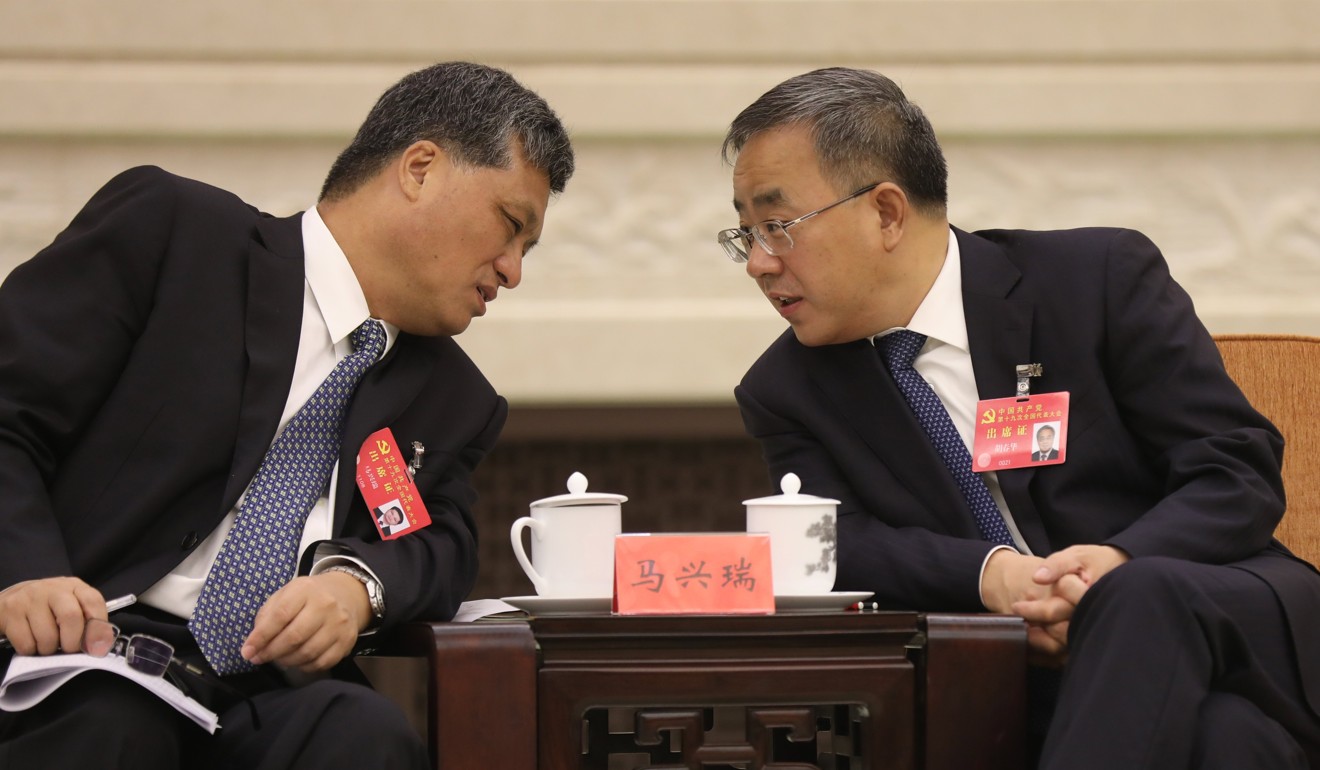
Hu is tipped to oversee Xi’s signature poverty alleviation campaign.
A mid-ranking poverty relief official with the State Council said Hu, 54, would definitely be the vice-premier overseeing poverty reduction work, succeeding Wang Yang.
“In fact, Hu has already started to attend meetings and sign his name on documents related to poverty alleviation,” the official said. “Officials in this field are now reporting to Hu about their work.”
In the first stage of Xi’s rejuvenation blueprint, no Chinese should be living under the poverty line – set at an annual per capita income of 2,300 yuan (US$365) – by 2020. More than 30 million people were still living below it in the second half of 2017, even though more than 55 million were lifted out of poverty between 2013 and 2016, the first three years of Xi’s presidency.
Decades of party tradition suggest a vice-premier must be a Politburo member. Three of the four incumbent vice-premiers – Zhang Gaoli, Liu Yandong and Ma Kai – left the Politburo after October’s party congress, while Wang was promoted to the Politburo Standing Committee and is set to become chairman of the Chinese People’s Political Consultative Conference (CPPCC), the top political advisory body, this month.
Han, 63, is tipped to succeed Zhang as executive vice-premier because of his party seniority, but whether he will assume responsibility for macroeconomic policy, the top-ranked vice-premier’s traditional fief, remains to be seen given 66-year-old Liu’s track record as head of the general office of the party’s Central Leading Group for Financial and Economic Affairs.
“Han Zheng has been considered the front-runner to be the vice-premier overseeing environment protection,” said a Beijing-based source who declined to be named, adding that Liu would be put in charge of preventing economic risks.
With pollution becoming a major concern in Shanghai in late 2012, and reports that some expat workers were considering leaving the megacity, China’s financial hub, because of its poor air quality, the municipal government, under Han’s leadership, rolled out an ambitious Shanghai Clean Air Action Plan, pledging to cut levels of PM2.5 – respirable suspended particles with a diameter of 2.5 microns or less that have been linked to cancer – by 20 per cent of the 2013 level by the end of 2017.
In 2016, Shanghai’s government said on its official website earlier that the municipality had managed to slash PM2.5 levels by 27 per cent a year ahead of schedule.
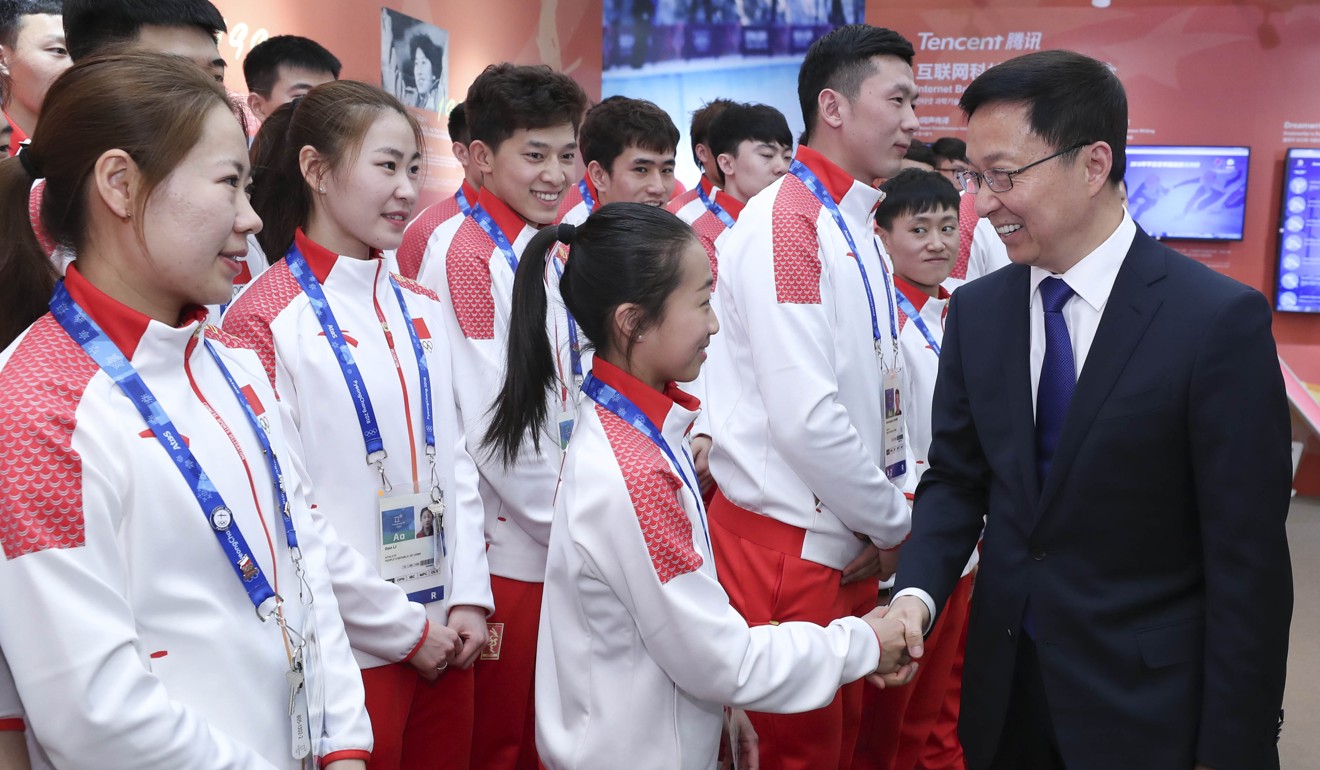
Han represented Xi at the opening ceremony of last month’s Winter Olympic Games in Pyeongchang, South Korea, in a clear public signal that he is ready to take over from Zhang in overseeing Beijing’s preparations for the 2022 Winter Games.
Han was Shanghai’s youngest mayor in half a century when he was appointed to that role in 2003 at the age of 49.
Before becoming a member of the Politburo Standing Committee in October, he spent more than four decades in Shanghai, with no experience elsewhere. Officials in the municipality viewed him as a cautious, mild-tempered cadre who spared no effort to toe the party line set by top leaders in Beijing.
Unlike Han, who was born and raised in China’s biggest city, Hu hails from a remote and poverty-stricken mountainous area in the western part of central China’s Hubei province. In 1979 he became the first student from his hometown to be admitted to Beijing’s prestigious Peking University.
“Hu has heartfelt personal experience of the impoverished lives of the underprivileged and could do a good job in poverty relief as he has the poorest family background compared to his 24 Politburo colleagues,” a Beijing-based source close to the government said.
A report in an official party magazine in 2008 said Hu was born in 1963 to a poor peasant family deep in the mountains of Wufeng, one of the poorest counties in Hubei.
“To save money for his poverty-stricken family, Hu did not live at school during his six years of junior and high school,” the report said. “He used to spend more than an hour to walk the 6.5km of rough pathway to school every day.”
A source who grew up with Hu in the same backwater village told the South China Morning Post they had sometimes been starving. “We were so poor in our childhood that we had no shoes to wear, and nor could we be sure where the next meal was coming from.”
Under Hu’s administration, Guangdong set an ambitious goal of eradicating poverty by 2018 – ahead of the national target of 2020. But that goal was not included in the provincial government’s annual report this year, with some Chinese media reporting the authorities had admitted it could not be achieved.
Successfully heading the government’s poverty relief efforts would be likely to boost Hu’s prospects for promotion to the Politburo Standing Committee in 2022.
Beijing-based political analyst Zhang Lifan likened the job to offering a carrot to Hu, an ally of former president President Hu Jintao.
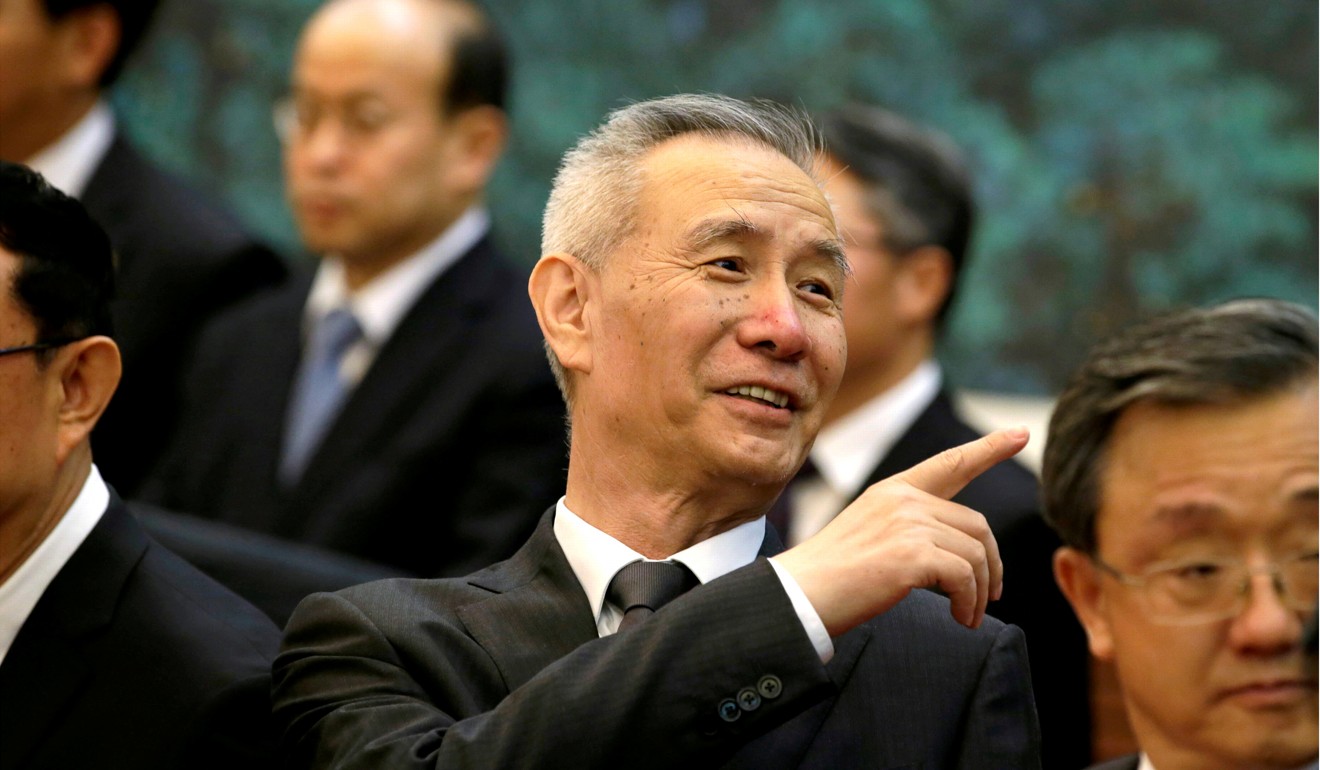
Zhang said Han’s environmental protection portfolio could prove more of a burden.
“Unlike doling out money in poverty relief work, pollution control could sabotage the interests of regional governments and irritate local officials,” he said. “It’s no easy for Han, particularly as he has no governance experience in regions other than Shanghai.”
Hu may also oversee agriculture, forestry, water resources and tourism as vice-premier, and possibly trade and commerce.
But if Hu is given trade and commerce he is likely to play a less crucial role than Wang Yang, with the party’s former anti-graft tsar, Wang Qishan, set to be become vice-president and the point man for Sino-US relations.
Steve Tsang, director of the SOAS China Institute in London and author of China in the Xi Jinping Era, said Liu, one of Xi most trusted aides, was poised to take on the financial portfolio and perhaps other cabinet responsibilities.
“If the premier is himself sidelined, his official lieutenants being given important functions still weakens the State Council as an institution, and power is still drifting away from the State Council to the president or [party] general secretary whose close ties with specific members of the State Council enable them to take on larger roles, regardless of the wishes of the premier or the State Council as a collective decision-making body,” he said.
Aside from Liu, a number of other Xi allies are likely to continue to play key roles in the new cabinet, including National Development and Reform Commission chairman He Lifeng, Commerce Minister Zhong Shan and Environment Minister Li Ganjie.
“Xi likes people he used to work with … you have the feel those people clearly have more access,” said Fraser Howie, author of Red Capitalism.
Christopher Balding, an associate professor of finance and economics at Peking University HSBC Business School, said Xi appeared to be putting his own people in key positions so he could “depend on them to execute his decisions”.
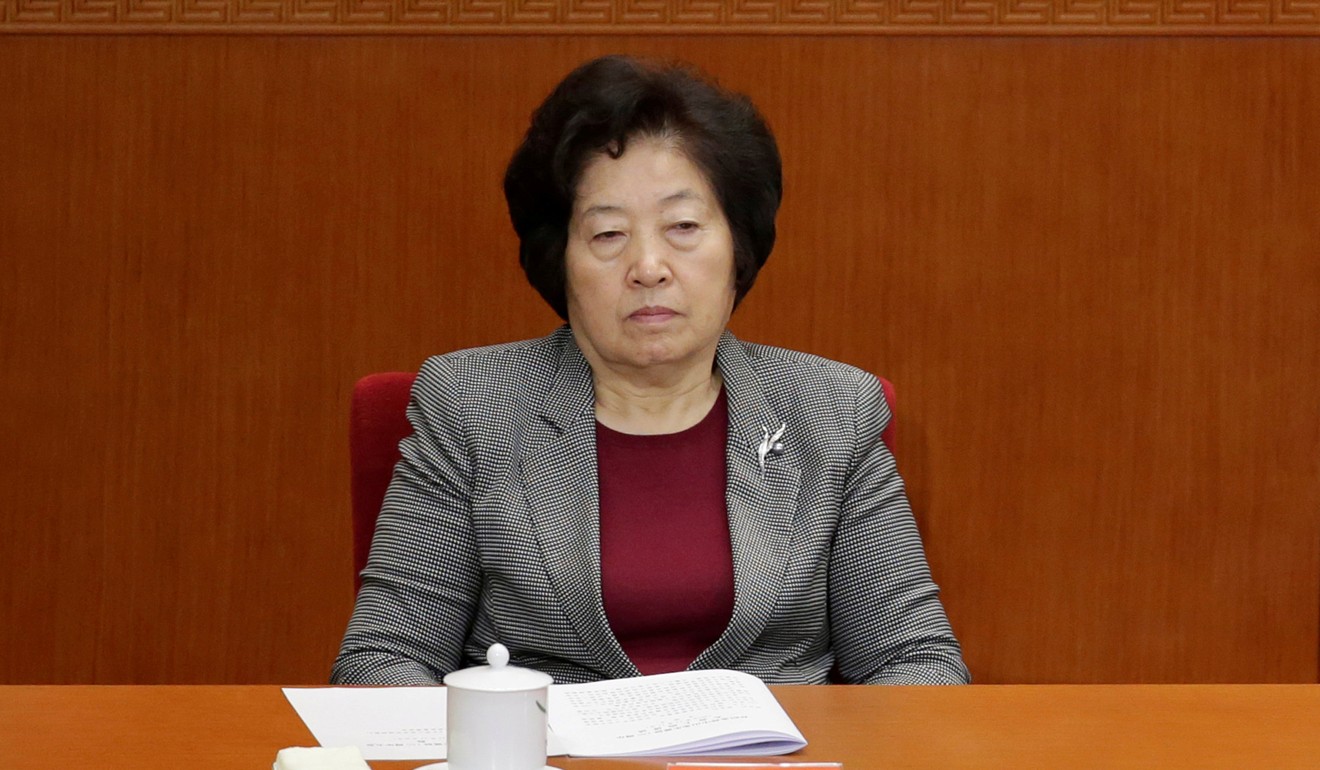
“Whether that means Xi is telling them exactly what to do or he trusts them to do what he tells them to do, things like that are very, very difficult to say,” Balding said.
Sun is likely to succeed Liu Yandong as the cabinet’s only female vice-premier and oversee largely the same areas, ranging from science, education, culture and health care to sport, news and publications.
One source said Sun made for an unlikely ethnic affairs supremo and quoted a mid-ranking official with the State Ethnic Affairs Commission as saying: “Not long after she was named the united front department head, Sun declined to say anything after Yu Zhengsheng, her boss, gave a speech at a gathering about ethnic issues. She simply passed the microphone to Wang Zhengwei, then the top ethnic affairs official, making the excuse that she was not familiar with the issue.”
To the surprise of many, Sun was moved from Tianjin, where she was the municipality’s party chief, in late 2014 to become head of the party’s United Front Work Department, which deals with ethnic issues among others.
Sun passed the united front baton to You Quan in early November, a couple of weeks after the party congress.
Finance Minister Xiao Jie is likely to become a state councillor and succeed the recently demoted Yang Jing as State Council secretary general. Foreign Minister Wang Yi, Central Military Commission member General Wei Fenghe and Public Security Minister Zhao Kezhi are also likely to become state councillors, with Wang Yi responsible for foreign affairs, Wei in charge of defence and Zhao looking after security and the judiciary.
It is unclear if Wang Yong will remain the state councillor in charge of supervisory work on state-owned enterprises and workplace and drug safety.



